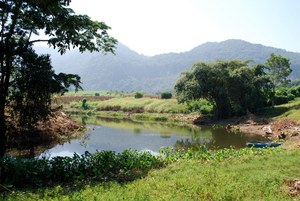
Brian Cochran ’12 and Andrew Villacastin ’12, students at Berkeley Law’s International Human Rights Law Clinic (IHRLC), played a substantial role in helping Mexican indigenous villagers file a human rights complaint against a U.S.-backed hydroelectric project.
Located in Oaxaca, Mexico, the project is financed by the Overseas Private Investment Corporation (OPIC), a U.S. government agency. Although construction has begun, local villagers have not been fully consulted or informed of the health and environmental impacts of the project, which threaten to contaminate local drinking water and fishing areas to produce energy for private companies.
Cochran and Villacastin helped research and draft the complaint, working under the supervision of IHRLC Acting Director and Assistant Clinical Professor Roxanna Altholz and in partnership with San Francisco-based Accountability Counsel, one of the villagers’ representatives. The complaint was filed Nov. 30 with OPIC’s Office of Accountability.
It is only the fifth case to be filed with the office, which Congress created in 2005 to address complaints from affected communities. The villagers’ complaint seeks the office’s assistance with resolving community concerns about the project and holding OPIC accountable for its failure to follow its own policies and procedures.
“The more we researched, the more we discovered how much the project developers excluded the local communities from the decision-making process,” Villacastin said. “I’m very proud to have helped these people voice their concerns, and hopefully compel outside business interests to involve them in decisions that impact their land.”
The complainants are predominantly members of the Chinanteco indigenous group living near the Cerro de Oro Dam, which the project seeks to expand in order to produce hydroelectric energy.
“In the 1980s, the World Bank financed the dam’s construction and forcibly displaced approximately 26,000 Chinantecs, irrevocably altering the local environment,” Altholz said. “Conduit Capital Partners LLC, a U.S.-based project investor, received $60 million from OPIC for this and other hydroelectric projects in Latin America.”
Mostly farmers and laborers, the complainants are from one of Mexico’s poorest and most vulnerable regions. They harvest fruits, rubber, sugarcane, and other natural products from the land and use fishing to supplement their incomes and diets.
“Project construction is adversely impacting the communities,” Altholz said. “Cement has leaked into their drinking water, blasts from explosives have damaged their homes, and land acquisition practices have disrupted the local leadership and culture.”
In addition to unraveling the legal issues involved, Cochran and Villacastin had to hurdle some daunting logistical hurdles. Says Cochran, “the most challenging aspect was working in coordination with all of the various actors, located in different cities in the U.S. and Mexico, to produce a well-polished, coherent, and compelling argument for intervention in the project area with demanding deadlines.”